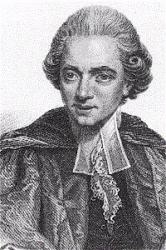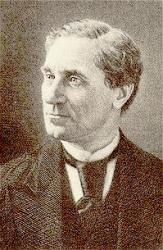Planning worship?
Check out our sister site, ZeteoSearch.org,
for 20+ additional resources related to your search.
- |
User Links
Person Results
Charles Burney

1726 - 1814 Composer of "TRURO" in Isles of Shoals Hymn Book and Candle Light Service A music historian and composer, Burney attended Shrewsbury School and the Free School, Chester. He was apprenticed to Thomas Arne from 1744 to 1746. In 1749, he became organist at St. Dionis’ Backchurch, London. In 1751 moved to King’s Lynn, Norfolk, where he taught and played the organ. His works include:
Music, Men, and Manners in France and Italy, 1770
A General History of Music, from the Earliest Ages to the Present Period (London: 1776-89)
Sources:
Findagrave, accessed 18 Nov 2016
Nutter, p. 454
© The Cyber Hymnal™. Used by permission. (www.hymntime.com)
Charles Burney
Michael Praetorius

1571 - 1621 Composer of "PUER NOBIS NASCITUR" in The Chapel Hymnal Born into a staunchly Lutheran family, Michael Praetorius (b. Creuzburg, Germany, February 15, 1571; d. Wolfenbüttel, Germany, February 15, 1621) was educated at the University of Frankfort-an-der-Oder. In 1595 he began a long association with Duke Heinrich Julius of Brunswick, when he was appointed court organist and later music director and secretary. The duke resided in Wolfenbüttel, and Praetorius spent much of his time at the court there, eventually establishing his own residence in Wolfenbüttel as well. When the duke died, Praetorius officially retained his position, but he spent long periods of time engaged in various musical appointments in Dresden, Magdeburg, and Halle. Praetorius produced a prodigious amount of music and music theory. His church music consists of over one thousand titles, including the sixteen-volume Musae Sionae (1605-1612), which contains Lutheran hymns in settings ranging from two voices to multiple choirs. His Syntagma Musicum (1614-1619) is a veritable encyclopedia of music and includes valuable information about the musical instruments of his time.
Bert Polman
Michael Praetorius
John Warrington Hatton
1710 - 1793 Person Name: John Hatton, -1793 Composer of "DUKE STREET" in Hymns for Schools and Colleges John Warrington Hatton (b. Warrington, England, c. 1710; d, St. Helen's, Lancaster, England, 1793) was christened in Warrington, Lancashire, England. He supposedly lived on Duke Street in Lancashire, from where his famous tune name comes. Very little is known about Hatton, but he was most likely a Presbyterian, and the story goes that he was killed in a stagecoach accident.
Bert Polman
John Warrington Hatton
John Bacchus Dykes

1823 - 1876 Person Name: John B. Dykes Composer of "RIVAULX" in Hymns for the Living Age As a young child John Bacchus Dykes (b. Kingston-upon-Hull' England, 1823; d. Ticehurst, Sussex, England, 1876) took violin and piano lessons. At the age of ten he became the organist of St. John's in Hull, where his grandfather was vicar. After receiving a classics degree from St. Catherine College, Cambridge, England, he was ordained in the Church of England in 1847. In 1849 he became the precentor and choir director at Durham Cathedral, where he introduced reforms in the choir by insisting on consistent attendance, increasing rehearsals, and initiating music festivals. He served the parish of St. Oswald in Durham from 1862 until the year of his death. To the chagrin of his bishop, Dykes favored the high church practices associated with the Oxford Movement (choir robes, incense, and the like). A number of his three hundred hymn tunes are still respected as durable examples of Victorian hymnody. Most of his tunes were first published in Chope's Congregational Hymn and Tune Book (1857) and in early editions of the famous British hymnal, Hymns Ancient and Modern.
Bert Polman
John Bacchus Dykes
Anonymous
Person Name: Anon. Composer of "STIRLING" in The Song Companion to the Scriptures In some hymnals, the editors noted that a hymn's author is unknown to them, and so this artificial "person" entry is used to reflect that fact. Obviously, the hymns attributed to "Author Unknown" "Unknown" or "Anonymous" could have been written by many people over a span of many centuries.
Anonymous
F.-H. Barthélémon

1741 - 1808 Person Name: Francois H. Barthelemon, 1741-1808 Composer of "MORNING HYMN" in Songs for the Chapel French violinist, composer, teacher, he became active in England, playing in an Italian comedy orchestra and led a band. He wrote opera, ballet, theatre music and ballads, popular songs, masques, concertos and 6 symphonies.
John Perry
F.-H. Barthélémon
F. Venua
1788 - 1872 Person Name: F. M. A. Venua Composer of "PARK STREET" in Hymnal Amore Dei Frederic Marc Antoine Venua; English composer
Evangelical Lutheran Hymnal, 1908
Born to an Italian family in France, Venua attended the Paris Conservatory, and studied composition in London.
He directed and composed for the ballet orchestra at the King’s Theater, and belonged the British Royal Society of Musicians.
He retired to Exeter in 1858.
© The Cyber Hymnal™ (http://www.hymntime.com/tch/bio/v/e/n/u/venua_fma.htm">Frederick Marc Antoine Venua)
F. Venua
Jeremiah Clarke
1669 - 1707 Person Name: Jeremiah Clark Composer of "BROMLEY" in A. M. E. C. Hymnal
Jeremiah Clarke
Octavius B. Frothingham

1822 - 1895 Person Name: Octavius Brooke Frothingham, 1822 - 95 Author of "Thou Lord of Hosts, whose guiding hand" in Service Book and Hymnal of the Lutheran Church in America Frothingham, Octavius Brooks, M.A., son of Dr. N. L. Frothingham, was born at Boston, Nov. 26, 1822, and educated at Harvard, graduating in Arts, 1843, and in Theology, 1846. In 1847 he became Pastor at Salem, from whence he passed to Jersey City, 1855; and again to the 3rd Unitarian Society, New York, 1860.
His works are numerous and well known. Mr. Frothingham is known as a leader of the Free Religious movement. His hymn, "Thou Lord of Hosts, Whose guiding hand" (Soldiers of the Cross), was written for the Graduating Exercise of the class of 1846 (see also "God of the earnest heart"), and published in the same year in Longfellow and Johnson's Book of Hymns, No. 425. It has been adopted by Dr. Martineau in his Hymns of Praise & Prayer, 1873.
[Rev. F. M. Bird, M.A.]
--John Julian, Dictionary of Hymnology (1907)
Octavius B. Frothingham
Christopher Edwin Willing
1830 - 1904 Person Name: Christopher E. Willing Composer of "ALSTONE" in The Pilgrim Hymnal Christopher Edwin Willing; Devon, England, 1830
Evangelical Lutheran Hymnal, 1908
Christopher Edwin Willing


 My Starred Hymns
My Starred Hymns


